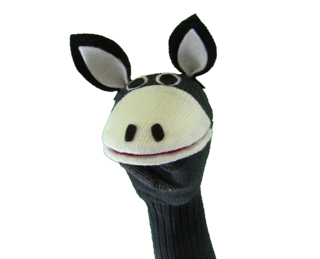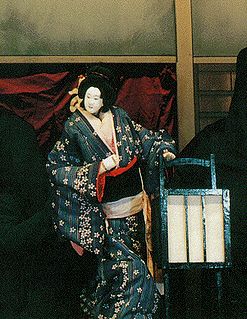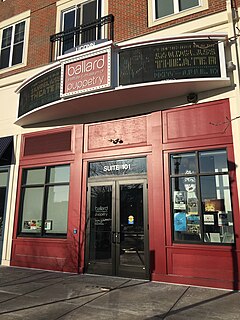Clash or The Clash may refer to:

A puppeteer is a person who manipulates an inanimate object, called a puppet, to create the illusion that the puppet is alive. The puppet is often shaped like a human, animal, or legendary creature. The puppeteer may be visible to or hidden from the audience. A puppeteer can operate a puppet indirectly by the use of strings, rods, wires, electronics or directly by his or her own hands placed inside the puppet or holding it externally or any other part of the body- such as the legs. Some puppet styles require two or more puppeteers to work together to create a single puppet character.

Puppetry is a form of theatre or performance that involves the manipulation of puppets – inanimate objects, often resembling some type of human or animal figure, that are animated or manipulated by a human called a puppeteer. Such a performance is also known as a puppet production. The script for a puppet production is called a puppet play. Puppeteers use movements from hands and arms to control devices such as rods or strings to move the body, head, limbs, and in some cases the mouth and eyes of the puppet. The puppeteer sometimes speaks in the voice of the character of the puppet, while at other times they perform to a recorded soundtrack.

A sock puppet or sockpuppet is a puppet made from a sock or a similar garment. The puppeteer wears the sock on a hand and lower arm as if it were a glove, with the puppet's mouth being formed by the region between the sock's heel and toe, and the puppeteer's thumb acting as the jaw. The arrangement of the fingers forms the shape of a mouth, which is sometimes padded with a hard piece of felt, often with a tongue glued inside.

Bunraku, also known as Ningyō jōruri (人形浄瑠璃), is a form of traditional Japanese puppet theatre, founded in Osaka in the beginning of the 17th century. Three kinds of performers take part in a bunraku performance: the Ningyōtsukai or Ningyōzukai (puppeteers), the tayū (chanters), and shamisen musicians. Occasionally other instruments such as taiko drums will be used.
Puppet Master or Puppetmaster may refer to:

Glove puppetry is a type of opera using cloth puppets that originated during the 17th century in Quanzhou or Zhangzhou of China's Fujian province, and historically practised in the Min Nan-speaking areas such as Quanzhou, Zhangzhou, the Chaoshan region of Guangdong, and other parts of southern China. It had since established itself contemporarily as a popular art form in Taiwan.
A hand puppet is a type of puppet that is controlled by the hand or hands that occupies the interior of the puppet. A glove puppet is a variation of hand puppets. Rod puppets require one of the puppeteer's hands inside the puppet glove holding a rod which controls the head, and the puppet's body then hangs over most or all of the forearm of the puppeteer, and possibly extends further. Other parts of the puppet may be controlled by different means, e.g., by rods operated by the puppeteer's free hand, or strings or levers pulled the head or body. A smaller variety, simple hand puppets often have no significant manipulable parts at all. Finger puppets are not hand puppets as they are used only on a finger.
A jester is a type of entertainer.
Sakorn Yang-keawsot was a Thai puppeteer. He was a master of the hun lakorn lek. Also known by his English nickname, Joe Louis, in 1985 he founded the Joe Louis Puppet Theatre. He was named a National Artist for performing arts in 1996.
Frank Marshall may refer to:

A puppet is an object, often resembling a human, animal or mythical figure, that is animated or manipulated by a person called a puppeteer. The puppeteer uses movements of their hands, arms, or control devices such as rods or strings to move the body, head, limbs, and in some cases the mouth and eyes of the puppet. The puppeteer often speaks in the voice of the character of the puppet, and then synchronizes the movements of the puppet's mouth with this spoken part. The actions, gestures and spoken parts acted out by the puppeteer with the puppet are typically used in storytelling. Puppetry is a very ancient form of theatre which dates back to the 5th century BC in Ancient Greece. There are many different varieties of puppets, and they are made from a wide range of materials, depending on their form and intended use. They range from very simple in construction and operation to very complex.

Tholpavakoothu (inMalayalam:തോൽപാവകൂത്ത് is a form of shadow puppetry that is practiced in Kerala, Tamil Nadu, India. It is performed using leather puppets and is performed in temples or in villages in specially built theatres. This form of art is especially popular in the Madurai and nearby districts of Madurai in TamilNadu and also in palakkadThrissur and Malappuram districts of Kerala.
Mike Quinn is an English puppeteer, animator, actor, director, producer, voice-over artist, puppet builder, composer and mentor. He is also known as Mike Quinby, Michael E. Quinn, and Michael Quinn.
In comics, Puppet Master may refer to:

Farooq Qaiser was a Pakistani artist, newspaper columnist, TV show director, puppeteer, script writer, and voice actor. He was known as the creator of the fictional puppet character Uncle Sargam introduced in 1976 in children's television show Kaliyan. Farooq was also a cartoonist, newspaper columnist and wrote for the newspaper Daily Nai Baat in Lahore and under the pen name "Meethay Karelay".

The Ballard Institute and Museum of Puppetry (BIMP) is a public museum of puppetry operated by the University of Connecticut and located in Storrs, Connecticut.








